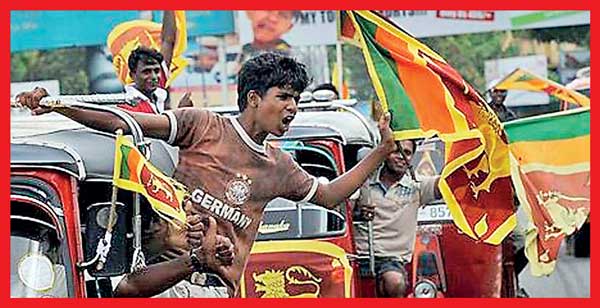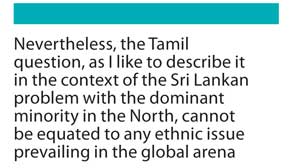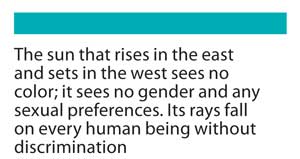Reply To:
Name - Reply Comment
Last Updated : 2024-04-23 18:56:00

Let us not constrain ourselves to the arguments and debates bandied about by so-called pundits. Most of these self-proclaimed pundits, university academics, professionals and leadership groups usually are almost always wrong or late in understanding the real reasons behind a knotty issue that has been irking our nation- Sri Lanka- for quite a long time. The ‘Tamil question’ and its multiple facets, ranging from a Tamil homeland, discrimination at all levels of civil life, independence of movement, assembly and speech to university entrance anomalies, are all deeply rooted in a fundamental premise of being treated as second-class citizens in a country whose Constitution enshrines clauses and chapters upholding and protecting all minorities as equal before the law.

Whether any Sinhalese agrees or not, the writer, a Sinhalese Buddhist, most unequivocally writes and affirms that it is beyond any shadow of doubt or suspicion that the notion of that ill-treatment of our minorities is a fact. The inbred thinking of the majority Sinhalese is fundamentally flawed.That flaw is shared by all majority communities of the human family.In the context of nation states and racial demarcations, it has been observed that the power of the majority almost always prevailed. However, in modern history- excluding, of course, the countries that were ruled by colonial powers of the British Empire and other imperial powers such as the Portuguese and Dutch- South Africa, until the white-minority rule eventually gave up under international pressure, was the last country where a majority was ruled by an under-numbered minority.
Furthermore, the Palestinian issue which has been festering for more than six decades remains an exception to this sociopolitical dynamic. In fact, largely the Arab-related unrest in the world, dominated by ISIS and Al Qaeda, could be traced to this festering wound of the Palestinian people. Western powers led by the USA have chosen to ignore that fact but are paying a steep price for this unilateral policy as is evidenced in the last few weeks in France, Germany and Brussels.
Nevertheless, the Tamil question, as I like to describe it in the context of the Sri Lankan problem with the dominant minority in the North, cannot be equated to any ethnic issue prevailing in the global arena. Yet, the fundamentals of the issue remain quite similar to some of the ethno-socio issues dominating the world-stage. Perversion of historical facts and portraying such perversions as historical specifics is at the core of these issues. While the Sinhalese majority is holding on to their historical records as true and authentic, the minority Tamils are persistent with their own claims that the landmass falling within the Northern and Eastern Provinces of Sri Lanka is exclusively their homeland, and this dichotomous spectacle is keeping the protagonists of the two communities apart. The people of both communities may have already got tired of the debates and arguments for and against each position. The overwhelming pressure on the leaders of Sinhalese as well as Tamil communities has had a manifest effect on them and their stoic allegiance to their respective positions has contributed to driving a sizable section of both peoples to their respective fringes. This became evident in the context of the Tamils in the emergence of militants who eventually turned out as terror groups such as the Liberation Tigers of Tamil Elam (LTTE) and other Tamil terrorist armies. On the other hand the Sinhalese fringe groups rallied around Bodu Bala Sena and Ravana Balakaye and like-minded organisations.

It may also be true that these fringe groups’ endurance as active agitators, especially among Sinhalese people,is essentially of temporary nature. They tend to spring up only as and when some controversial issue or issues emerge in the sociopolitical horizon. Nevertheless, the Tamil agitations, as seen in the past, have had a more enduring life cycle. Some bigoted journalists and ill-informed writers who hold a ‘pro-Sinhalese’ viewpoint may be engaged in a thoroughly destructive campaign to throw the proverbial baby with the bathwater. Being a caste-ridden community whose values and social measures are weighed in terms of the various tiers of that caste ladder each person or family occupies, Tamils are not second to Sinhalese. The very hierarchy of our Buddhist clergy and its conduct in which monks are ordained is inexcusable. The various divisions amongst the sects or Nikayas is founded and practised strictly in accordance with the caste of each family and the newcomer to the clergy is accepted or rejected by the same measure. This practice on the part of the Siam Nikaya hierarchy is diametrically opposed to the teachings of the Buddha who they themselves claim to be the first religious leader who denounced the caste system that prevailed in India during his time.
Bigotry is amply displayed by both sides of the aisle. The serene shrine rooms in Buddhist temples have been despicably desecrated by caste classifications. On the other hand, some Hindu kovils still remain temples of taboo for the so-called low-caste Tamils.
 Absence of mutual empathy on the part of both communities is an undeniable fact. If it is so, one would see how difficult it is to bring these two communities together to the same table to arrive at a middle ground where both communities can co-exist and argue and debate as co-equal partners. Doggedly holding on to one’s unsustainable position would not bring any results, results that would harness some resolutions aimed at peaceful co-existence of the two communities. In this effort, how far has each set of leaders travelled? The answer is hardly any. Starting from the aborted Thimpu Talks in the nineteen eighties, the leaders of the two parties have failed to travel to the middle ground. Compromise sounds terrible in the context of negotiation. Its inherently a negative connotation that retards the advance of any party that is willing to travel towards the middle ground. It makes the traveller look weak and spineless in the eyes of his or her followers.
Absence of mutual empathy on the part of both communities is an undeniable fact. If it is so, one would see how difficult it is to bring these two communities together to the same table to arrive at a middle ground where both communities can co-exist and argue and debate as co-equal partners. Doggedly holding on to one’s unsustainable position would not bring any results, results that would harness some resolutions aimed at peaceful co-existence of the two communities. In this effort, how far has each set of leaders travelled? The answer is hardly any. Starting from the aborted Thimpu Talks in the nineteen eighties, the leaders of the two parties have failed to travel to the middle ground. Compromise sounds terrible in the context of negotiation. Its inherently a negative connotation that retards the advance of any party that is willing to travel towards the middle ground. It makes the traveller look weak and spineless in the eyes of his or her followers.
This happens because the leadership of these fringe groups is rotten from top to bottom. Suzy Kassem, a relatively young American writer, film director,philosopher, author, and poet of Egyptian heritage in her book, ‘Rise Up and Salute the Sun’ wrote thus: “Most importantly, a great leader must serve the best interests of the people first... Human life should never be sacrificed for monetary profit. There are no exceptions. In addition, a leader should always be open to criticism, not silencing dissent. Any leader who does not tolerate criticism from the public is afraid of their dirty hands to be revealed under heavy light. And such a leader is dangerous, because they only feel secure in the darkness. Only a leader who is free from corruption welcomes scrutiny; for scrutiny allows a good leader to be an even greater leader”.
Leadership of men is not a light weight. Its awesome burden can cause its carrier to succumb when confronted with uncommon impediments. It can crush a weak-kneed carrier and make him look like an uncommon man carrying an uncommon weight. That exceptional leadership, both among the Sinhalese and Tamil ranks, is lacking today. A leader should not shy away from appealing to his own ethnic group and convince them that middle ground is not betrayal of a people and their traditions; on the contrary, it is the strength of determined leadership; only the weak cannot travel to the middle. Our history books may glorify military victories and conquests, but as Chanakya, the ancient sage of political science said ‘the primary duty of a leader is to make his people free of fear’. Conquests have been achieved and countries annexed, but the free spirit of a people cannot be arrested and kept behind steel bars.
The sun that rises in the east and sets in the west sees no color; it sees no gender and any sexual preferences. Its rays fall on every human being without discrimination. The hands that till the land, the feet that tread its pathways in search of greener meadows to feed a hungry family and the spine that carries centuries-old traditions of peaceful living and compassionate care has to triumph. Any racially-motivated alternative to such a burdensome journey, whether led by violence or not, might bring about short-term gains, but eventually will have to give way to middle-grounders whose tireless feet and unbent knees had carried the burden of leadership without fear or fervor. That leadership which is not frightened by scandal and checkmated by corruption will ultimately stand the test of time. Then the sociopolitical landscape of our nation would change forever.
The writer can be contacted at vishwamithra1984@gmail.com

Add comment
Comments will be edited (grammar, spelling and slang) and authorized at the discretion of Daily Mirror online. The website also has the right not to publish selected comments.
Reply To:
Name - Reply Comment
On March 26, a couple arriving from Thailand was arrested with 88 live animal
According to villagers from Naula-Moragolla out of 105 families 80 can afford
Is the situation in Sri Lanka so grim that locals harbour hope that they coul
A recent post on social media revealed that three purple-faced langurs near t